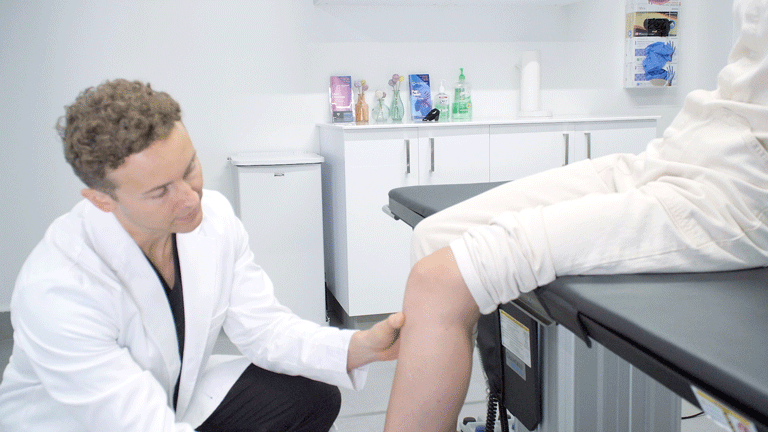What’s the Best Knee Pain Treatment Midtown? | a Harvard Doctor Weighs In
Do I Need Knee Surgery? | Advice From A Harvard Pain Doctor
If you have knee joint problems, you might be wondering where to find the best knee pain treatment midtown manhattan. The knee joint is a large hinge joint which bends forwards and backwards. It is necessary for movement and to support our weight. If we have acute or chronic knee pain, it can be difficult to rest our knee and recover.
There are many different causes of knee pain. Knee joint issues can be a result of an injury or a symptom of an underlying health condition. That’s why it’s highly recommended you seek medical advice from a board certified pain doctor nyc.

Surgery is inherently risky and can lead to secondary health issues. Some of the most common surgical risks include: blood clots, problems with anesthesia, wound infections and long recovery periods. Surgery can also contribute to over-reliance on pain medications. Taking opioids, narcotics and NSAIDs for long periods of time can have adverse health effects. It is no secret that the U.S. is in the midst of an opioid epidemic.

The Pain Treatment Specialists NYC are proud to offer the latest techniques in regenerative medicine using cutting-edge technology. Their clinic is a Center of Excellence and welcomes patients from around the world who come to receive first-class patient care. The state of the art clinic is located in midtown manhattan next to The Empire State Building and has excellent public transport links.
What Are The Best Knee Treatments?
The best pain management is provided by expert pain specialists at The Pain Treatment Specialists Manhattan. Rather than undergoing risky surgery or having to take narcotics, the healthiest knee pain treatment midtown uses minimally invasive options. Let’s explore some of the most common knee joint treatments on the market.
Platelet Rich Plasma Injections
Platelet rich plasma injections (prp treatment) is an exciting area of pain medicine. Prp treatment combines the body’s own healing abilities with the latest advancements in regenerative medicine.
During this procedure, a pain doctor nyc draws up a small volume of your blood into a syringe. The blood is then run through a centrifuge to condense the platelets in the blood. These platelets are then injected into the joint of the knee directly to the source of pain. The platelets stimulate the growth of healthy new cells and tissues.
Steroid Injections
Steroid injections are a popular treatment choice. They describe when a pain physician uses a combination of local anesthetic and steroid medicine to numb the knee joint and combat pain. The steroid medicine reduces any inflammation and the local anesthetic stops pain sensations.
Steroid injections are usually the first line of treatment recommended by pain doctors nyc. They are fast, simple to apply and help individuals to return to daily activities with relative ease.
Hyaluronic Acid Injections
Hyaluronic acid injections (HA injections) help to lubricate the knee. It is a component of joint fluid which allows the knee to move with relative ease.
If you have a condition like osteoarthritis, it means your knees are stiff and painful due to friction in the joint. This friction arises because the wear and tear over time has caused the cartilage on the ends of the bones in the joint to rub away. This causes friction and bony spurs to form. Hyaluronic acid injections can combat this problem by delivering lubrication to the knee joint. This helps the bones to glide one over the other and reduce any pain, swelling and stiffness.
Genicular Nerve Block
A genicular nerve block describes when a pain doctor uses local anesthetic to ‘block’ out pain sensations.
During this procedure, a pain physician ny injects local anesthetic near the genicular nerves in the knee joint. The genicular nerves are sensory nerves that send pain information from the joint of the knee to the brain. Once the pain information reaches the brain, it registers the pain. However, a pain doctor can inject local anesthetic near the genicular nerves in the knee to ‘block’ pain signals from being transmitted from the knee to the brain.
Radiofrequency Ablation of the Genicular Nerve
Radiofrequency ablation is a popular treatment choice. It is recommended for patients not wanting to receive steroid medicine and has helped many patients to avoid knee surgeries.
Radiofrequency ablation is when a top pain doctor nyc uses a small generator to transmit small currents of radiofrequency energy. This energy is transferred from the generator to the genicular nerves in the knee joint. The radiofrequency energy thermally de-activates the genicular nerves. This means they no longer send pain signals to the brain. Long-term pain relief can be achieved during this pain-free and low risk procedure.
Why Do I Have Knee Pain?
There are many reasons you might experience knee pain. Below are some of the most common conditions that can lead to issues with knee joints.
- ACL injury – the anterior cruciate ligament is a large ligament which connects the thigh bone to the shinbone. This ligament can sometimes tear and is common in athletes playing sports that involve sudden changes of direction (e.g. soccer).
- Bursitis – the bursa are small fluid filled sacs that cushion the tendons, muscles and bones of the knee joint. These fluid filled sacs can sometimes become inflamed and this leads to knee pain.
- Tendonitis – this describes when the tendon becomes inflamed. It tends to occur as a result of overuse. This is why many athletes can be prone to developing tendonitis.
- Osteoarthritis – this is a mechanical form of arthritis caused by wear and tear over time. Repeatedly using the joint can wear down the existing cartilage in the knee joint. This causes friction and bony spurs can even form. As a result, someone with osteoarthritis may experience painful, stiff and inflamed knee joints.
Book a Consultation
Scheduling a consultation with one of our pain treatment specialists is one of the best ways to determine the proper solution for pain relief.














